Best Gaming Keyboard for 2023
From a full-size mechanical keyboard down to a TKL or smaller, you'll find the best models for gaming we've tested from Logitech, Razer, HyperX and more.
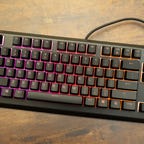
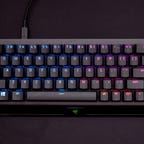
PC gamers know that a good gaming keyboard is one of the most important tools in their arsenal, but choosing the right one can be an overwhelming and seemingly impossible task. Paired with a great gaming mouse, the keyboard is how you make your conquest. We've done the work for you, so you don't need to take a risk on a keyboard that might be subpar.
For models that'll have a little less impact on your wallet, check out our picks of the best gaming keyboards under $100. But if you can spend more, you'll get features such as higher-quality switches and general construction, discrete media keys and controls, a wrist rest and more. And if you don't know what a membrane keyboard is or the difference between an optical switch and a mechanical switch, the buying advice section at the bottom will help.
Read more: Best Gaming Keyboard Under $100 for 2023
Just like picking out a new gaming mouse, getting the right gaming keyboard has a lot to do with personal preference (and budget). As for the two authors of this list, Josh likes tactile switches -- ones where you can feel the actuation point -- but doesn't like clicky key switches that make a sound. Lori likes clicky and tactile because she likes to feel the actuation point and likes the mechanical sound.
You might also find some keyboards great for gaming but not like them for day-to-day typing. For example, those same Cherry MX Red switches that are great for gaming might be too light for some typists. Linear switches, like Cherry MX Reds, don't have the tactile feedback that a Cherry MX Blue has, but because of their low force and smooth actuation they're preferred for gaming, especially where multiple taps of the same key are necessary. If you have a chance to test out different keyboards to determine your favorite switch type before you buy (such as Cherry MX Brown, Cherry MX Red and others), I highly recommend it. You can check out this glossary of keyboard terms to help narrow your preferences.
So, are you ready to find the best keyboard for your gaming needs? Read on for a closer look at 10 great options.
Bucking the trend, keyboard prices have dropped since the last time we updated this story. But a lot of people would still prefer not to drop $100 or thereabouts on a keyboard, especially if they're klutzy. SteelSeries' entry-level gaming keyboards, the Apex 3 ($50) and its tenkeyless little buddy ($45) trade membrane for mechanical switches, which may put some people off.
But in exchange it's quiet -- more suitable for day-to-day work from home -- and includes features you usually don't find in a budget keyboard, like cable management, six macro keys, 10 lighting zones and media controls. And best of all, for the chronic spillers among us, they're IP32 water-resistant.
If you're picky about feel, you may not be crazy about them. They're a little better than typical membrane switches, but after a while begin to feel a little mushy. And I wouldn't use them for any game that requires quick response, since they require more actuation force than clickys. But for sims and other games that don't require speed but do benefit from the programmability, either is a good choice.
The K100 Air is currently our favorite low-profile gaming keyboard. It's feature-packed, with all the wireless (2.4GHz and three Bluetooth pairing slots) and a dock for the PC/PlayStation-compatible dongle, as well as extra macro keys. Since it only comes with tactile keys it's not great for really fast-response games that benefit more from linear switches; it uses Cherry MX Ultra Low Profile mechanical switches. But it's got a great feel if tactile is your thing and it's pretty well built, which makes it terrific for the workday. Plus, battery life, even with RGB at full blast, is quite good, and if the battery dies you can use it wired while it charges. All of that's wrapped into the thinnest keyboard we've seen thus far.
The obvious downside is the price. It's not overpriced for what you get, but it's still at the high end of the range for keyboards. Read our Corsair K100 Air review.
Tied for favorite low-profile gaming keyboard, the Razer DeathStalker V2 Pro wireless model is well suited for people who need a faster response or quieter operating model, since it comes with Razer's optical linear switches (Red) as well as its clicky Purples. It shares a lot of the same advantages of the K100 Air -- full-featured, well designed and multidevice (Bluetooth and 2.4GHz) wireless. It's not as slim, but similarly high priced. Read our Razer DeathStalker V2 Pro review
The GMMK is the best deal in gaming keyboards. Yes, there are less expensive options, but the design and features of the Glorious Modular Mechanical Keyboard, to give it its full name, are unbeatable at its $110 price. Available in full, tenkeyless and 60% sizes and in black on black or white on silver colors, the keyboard is modular, letting you hot-swap its key switches. It comes standard with ABS doubleshot keycaps on top of Gateron Brown tactile switches, which work well for both gaming and typing. But you can also customize the keyboard with one of 13 other Gateron or Kailh switches or the company's Glorious Panda switches that are smooth but with a tactile bump you'll definitely feel. Or you can get just the board and put in your switch of choice. The same goes for the keycaps; there are four to choose from or you can get none at all.
The full-size keyboard has an attached braided USB cable with three-way routing under the board (it also has a keycap puller stored on the bottom). The two smaller boards have removable cables. The GMMK has a metal top with nice-looking beveled edges. It's a streamlined design with just the essentials; you won't find extra media controls or a volume dial or a big, bulky body to go with them. The bottom is plastic, but you can't see it unless you lift the board and, combined with the metal top, it has a heft to it that keeps it in place on your desk.
Even if you never swap out the switches or keycaps, this is an excellent gaming keyboard. It's the fact that you have the option to easily do those things, though, that makes the GMMK a standout.
gaming? There aren't that many around (most wireless keyboard options are 60% size without discrete navigation keys) and none that I've found that have Bluetooth and lag-free 2.4GHz wireless like the BlackWidow V3 Min HyperSpeed. That helps justify the higher price and it's also solidly built and is comfortable for typing, and smooth and fast for gaming. You are limited to two key switches -- linear and clicky tactile -- so if you want a tactile switch without the clicky sound, you're out of luck for the moment. Switch choices aside, if you're in search of a great little wireless mechanical gaming keyboard that can also be your daily driver for work, you've found it.
A compact TKL version of Corsair's excellent full-size K70 RGB MK.2 gaming keyboard, the K70 RGB TKL is designed for esports but has features any competitive gamer will appreciate. It uses Corsair's Axon processing technology to get a polling rate up to 8,000Hz that virtually eliminates the chance that input lag is going to cost you a victory. At 8,000Hz, it reports keypresses every 0.125 milliseconds and it has a 4,000Hz keyscan rate -- four times faster than competing keyboards -- so it's both detecting and transmitting keystrokes far faster than the average gaming keyboard with a 1,000Hz polling rate.
Corsair used Cherry MX Red mechanical switches, though in some regions it will be offered with MX Speed or Silent switches as well. The regular linear Red switches are fast, smooth and just reliably good. There's per-key RGB backlighting shining through durable double-shot PBT keycaps and Corsair also includes some textured keycaps for gaming. The keyboard's layout is better for travel and it has a removable braided USB-A-to-USB-C cable.
Next to the cable input, you'll find a switch that flips the keyboard into a tournament-ready mode. This makes the backlighting static and disables macro activations so there's no accidental presses while playing. You can still use other keys like the media and volume controls and change profiles, however.
Corsair's iCue software was overhauled recently to make setting up lighting, programming macros and remapping keys more straightforward. While you can create limitless profiles and lighting layers that are accessible when using iCue, you can also store up to 50 individual profiles to the keyboard's onboard memory. Those are accessible without running iCue and even when you're on systems that don't support iCue. You can also store up to 20 lighting layers.
If you're looking for a fast, full-featured compact keyboard for FPS and MOBA games, the K70 RGB TKL has you covered.
Available in full, TKL and 60% sizes with HyperX's own linear, tactile and clicky switches,
the HyperX Alloy Origins line offers a lot of diversity so you can find
just the right keyboard for your needs. All of them have slim,
streamlined designs with aluminum bodies and removable braided
USB-C-to-USB-A cables. You won't find discrete media controls like the
company's Elite 2 keyboard, but the function keys are marked out with
media controls as well as a Game Mode so you can disable the Windows key
and certain key combos while gaming.
The Elite 2 is a beefier version of HyperX's slimmer, lighter Alloy Origins and Origins Core TKL keyboards. Instead of an aluminum frame, the Elite 2 has a sturdier steel frame, which gives it some heft to keep it in place on your desk. A thick braided cable is attached at the back and there's a pass-through USB 2.0 port for your wired gaming mouse or wireless receiver.
The backlit keyboard is overall larger, too, with the addition of a light bar above the function keys and a separate bar with media controls and buttons for adjusting backlight brightness, choosing one of three custom light modes you can store on the keyboard and turning on the Game Mode, which turns off the Windows key and other key combos that might interfere with your gameplay.
However, like the Origins models, the Elite 2 uses the company's homegrown Red linear key switch features instead of the Cherry MX switch in the original. Smooth and fast, the HyperX Reds are comparable to the Cherry MX Red switch and perform just as well and should satisfy most gamers.
The switches use surface-mounted RGB backlight LEDs that are incredibly bright, so if you want a good lightshow from your gaming keyboard, this doesn't disappoint. Plus, the keyboard is set up with HyperX ABS pudding keycaps that let the light shine through their translucent sides.
Optical key switches are praised for their lightning-fast speed and long lifespan. The Vulcan TKL Pro's Titan optical switches add the feel of a really smooth linear mechanical switch to the formula giving you a great gaming experience. The keys, which have a muted clack to them, have a 1.4mm actuation point and no discernable wobble no matter how furiously you press them.
The keyboard is slim and lightweight and Roccat stripped away just about all of the frame around the keys keeping its footprint as small as possible. The floating keycap design gives Roccat's keyboards a unique look in the category and really lets the per-key RGB lighting shine. It also uses a detachable USB-C-to-USB-A cable.
The company's Swarm software isn't as straightforward to use as others, but you'll find all the same sort of design tools for creating custom lighting setups and macros with different profiles. You can even make your keypresses sound like laser blasts or a typewriter, among other things, through your speakers or headphones. And if you have other Roccat AIMO devices, the lighting can be matched between them.
If you're not sold on optical switches, Roccat's Vulcan TKL
has the same excellent design as the Pro but uses the company's Titan
linear switches. They have a similar but slightly lighter feel to them
compared to the optical switches with the same 1.4mm actuation point.
If you're going to spend nearly $200 to buy the best gaming keyboard you can find, the Razer Huntsman v2, along with its less expensive little brother the Huntsman v2 TKL, delivers excellent performance with either Razer's linear red optical switches or clicky purple optomechanical switches (which is $10 less). The two models replace the veteran Huntsman Elite (the v2) and Huntsman Tournament Edition (TKL), though the latter still exists in a green keycap model.
Razer matches Corsair's K series for its 8,000Hz polling, and combined with the swift response of the optically based switches adds minimal lag to your gaming experience, and brings the updated sound-dampening technology to the reds. There are media controls on the full-size keyboard, programmable just like all the other keys, and Razer's Synapse software provides extensive control over the keyboard's setup, which you can load into one of the keyboard's five profile slots. You can stick to presets if you're not into tweaking settings.
For the v2, Razer dropped the beautiful underglow lighting, but that means it no longer requires the second USB port on your computer. If you miss it, there's always the Razer Huntsman Analog v2 if you can stomach the $250 cost.
Most gamers swear by wired keyboards and for good reason: A wired keyboard eliminates lag and potential signal interference. That said, I didn't experience either while testing the G915 using its Lightspeed wireless adapter. This wireless gaming keyboard can be connected via Bluetooth, too, and as long as you keep the backlight off or low, battery life is fairly good.
The per-key RGB lighting, as well as all keys, can be programmed with Logitech's G Hub software. The app is generally easy to work with and you can set up to three profiles that you can change to without opening the software.
Its compact size and the company's low-profile GL Tactile switches make it a viable choice for work and gaming, which is good considering its list price of $230. You can also get it with GL Clicky or GL Linear switches and in two colors: carbon with black keycaps or silver with white caps.

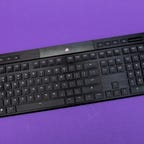
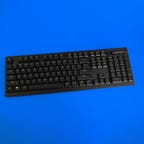
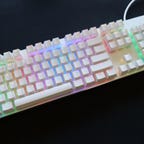





0 Comments